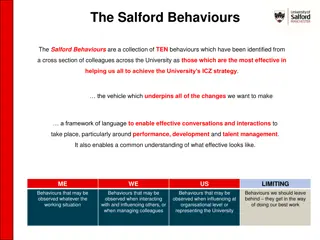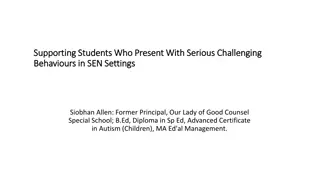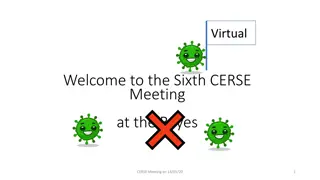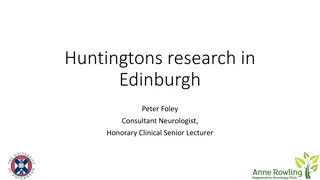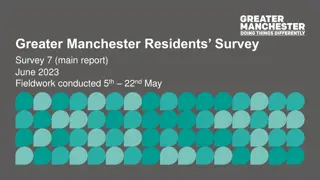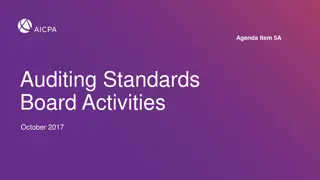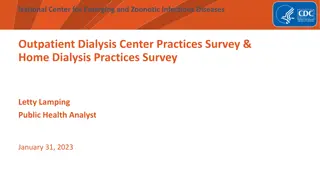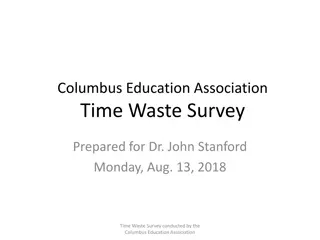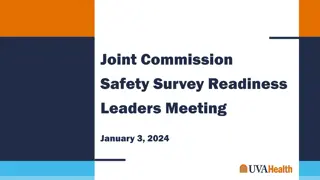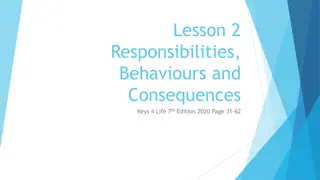Edinburgh Local Association Survey on Behaviours of Concern 2023
Edinburgh Local Association conducted a survey on Behaviours of Concern, with a total of 1009 responses collected. The survey revealed insights into the prevalence of violence, abusive and dysregulated behavior among teachers in Edinburgh. Key findings include the experiences of teachers in various sectors, feelings of safety at work, and the frequency of physical abuse since 2019. The survey provides valuable data to address these critical issues in the teaching community.
Download Presentation

Please find below an Image/Link to download the presentation.
The content on the website is provided AS IS for your information and personal use only. It may not be sold, licensed, or shared on other websites without obtaining consent from the author. Download presentation by click this link. If you encounter any issues during the download, it is possible that the publisher has removed the file from their server.
E N D
Presentation Transcript
Edinburgh Local Association: Behaviours of Concern Wednesday, May 17, 2023
Total Responses 1009 Date Created: Thursday, March 16, 2023 The survey was open for 3 weeks between Monday the 24thof April and Friday the 12thof May. An email link to the survey on the Survey Monkey platform was sent to all EIS members in Edinburgh. The average time for completion was 4 minutes 37 seconds. Non of the questions were mandatory, 2 questions allowed for further comment with an option for general statements at the end of the survey. Using the full number of registered EIS members as a baseline and a confidence level of 90% this survey returns a margin of error of 2%. The smaller the margin of error the greater the confidence you can have that the results reflect the views of the overall population. We are very confident that the experiences and views of those present in this survey are reflective of the general teaching population of Edinburgh.
Q1: Which sector are you working in? Answered: 1004 Skipped: 5 Primary 54.58% Secondary 39.34% Special 6.08% 0% 10% 20% 30% 40% 50% 60% 70% 80% 90% 100%
Questions 2 to 9 relate to the prevalence and effects of violence, abusive and dysregulated behaviour. 4
Q2: Do you generally feel safe at work? Answered: 1002 Skipped: 7 38 Average response 0 10 20 30 40 50 60 70 80 90 100 Very safe Very unsafe
Q3: Since 2019 which of the following statements reflect your experience? Answered: 1002 Skipped: 7 Since 2019 90% of Edinburgh teachers have experienced some form of abuse. I have directly experienced physical violence 11.98% I have directly experienced verbal abuse 38.52% I have experienced neither verbal abuse nor physical violence 9.58% I have experienced both verbal and physical abuse 39.92% 0% 10% 20% 30% 40% 50% 60% 70% 80% 90% 100%
Q4: Since the start of this session (August 2022), how frequently have you experienced physical abuse? Answered: 1001 Skipped: 8 Since August 2022 46% of Edinburgh teachers have experienced physical abuse at least once. Daily 2.00% At least once a week 7.49% At least once a month 5.89% Between 1 and 5 occasions 27.37% Between 5 and 10 occasions 3.30% Never 53.95% 0% 10% 20% 30% 40% 50% 60% 70% 80% 90% 100%
Q5: Since the start of this session (August 2022), how frequently have you experienced verbal abuse or the threat of violence? Answered: 1003 Skipped: 6 Since August 2022 79% of Edinburgh teachers have experienced verbal abuse or the threat of violence. Daily 11.27% At least once a week 21.73% At least once a month 11.76% Between 1 and 5 occasions 27.12% Between 5 and 10 occasions 7.78% Never 20.34% 0% 10% 20% 30% 40% 50% 60% 70% 80% 90% 100%
Q6: Have you experienced mental health/stress problems as a result of violence, verbal abuse or dysregulated behaviour at school? Answered: 1005 Skipped: 4 Yes 62.59% No 37.41% 0% 10% 20% 30% 40% 50% 60% 70% 80% 90% 100%
Q7: Have you required medical attention from a doctor or school first aider following a violent incident at work? Answered: 1005 Skipped: 4 Yes 8.56% No 91.44% 0% 10% 20% 30% 40% 50% 60% 70% 80% 90% 100%
Q8: Have you been absent from work due to physical violence or verbal abuse? Answered: 1007 Skipped: 2 Yes 10.43% No 89.57% 0% 10% 20% 30% 40% 50% 60% 70% 80% 90% 100%
Q9: How often does dysregulated behaviour interrupt your teaching and learning? Answered: 1005 Skipped: 4 67% of classes in Edinburgh are being disrupted by behaviour on a daily basis. More than once a day 40.90% Daily 27.06% At least once a week 18.01% At least once a month 8.96% Never 5.07% 0% 10% 20% 30% 40% 50% 60% 70% 80% 90% 100%
Questions 10 to 20 relate to the reporting and management of incidents and behaviours.
Q10: To what extent would you agree with the following statements? Answered: 1006 Skipped: 3 Only 23% of Edinburgh teachers are generally satisfied with the management of behaviour in our schools. 51% are generally dissatisfied. 6.37% 17.23% I am generally satisfied with the management of violence, aggression and dysregulated behaviour in my school. 24.70% 28.49% 23.21% 27.46% 30.15% Violence, verbal abuse, threats and dysregulated behaviour are accepted as "part of the job" in my school. 18.61% 57% of Edinburgh teachers feel that abuse is accepted as part of the job in their school. 13.03% 10.75% 0% 10% 20% 30% 40% 50% 60% 70% 80% 90% 100% Strongly agree Slightly agree Neither agree nor disagree Slightly disagree Strongly disagree
Q11: I am aware of the council's violence at work policy, and have been shown/attended a presentation from CEC on Behaviours of Concern. Answered: 1002 Skipped: 7 Yes 28.64% No 71.36% 0% 10% 20% 30% 40% 50% 60% 70% 80% 90% 100%
Q12: Does your school use the SHE portal to record all incidents of physical or verbal abuse? Answered: 1004 Skipped: 5 Yes 46.51% No 11.85% Don't know 41.63% 0% 10% 20% 30% 40% 50% 60% 70% 80% 90% 100%
Q13: Are you aware of any barriers in your school for completing incidents on the SHE portal? Answered: 1006 Skipped: 3 Yes 0.40% No 32.70% Don't know 49.50% If yes please provide details 17.40% 0% 10% 20% 30% 40% 50% 60% 70% 80% 90% 100%
Q13: Are you aware of any barriers in your school for completing incidents on the SHE portal? If yes please provide details. 175 responses The previous school I taught at, ***** **** it was discouraged to write it here and management would deal with it instead, which of course they didn t. It's lengthy, unclear, and difficult to access. Management have to be present when completing it, management have said directly to some staff they should not use the SHE portal after some incidents where they were not actually hurt.
Q13: Are you aware of any barriers in your school for completing incidents on the SHE portal? If yes please provide details. 175 responses Not so much completing the form but the usefulness of the completed form. It has no effective search function & cannot be used by a school to review & monitor their own data. Or, this is not known to me which feels just as significant. My impression is that it is a judgement call made by management as to whether it merits recording on she portal.
Q13: Are you aware of any barriers in your school for completing incidents on the SHE portal? If yes please provide details. 175 responses Staff are scared to tell HT what has happened as they feel unsupported when they do or blamed for what has happened. So many incidents of staff being sworn at and insulted that there is not enough time to complete the SHE portal for all incidents. Often impossible to get hold of a member of SLT to get the SHE portal completed (especially for support staff who finish at the end of the pupil school day) Staff do not see the point of completing the SHE portal, they see it as another bit of paperwork that has no impact on anything.
Q14: Have you or your Head Teacher had any response, feedback or support as a result of an entry on the SHE portal? Answered: 999 Skipped: 10 Yes 7.70% No 24.50% Don't know 67.70% 0% 10% 20% 30% 40% 50% 60% 70% 80% 90% 100%
Q15: Are you aware of the support you should be offered if you experience a violent incident? Answered: 1003 Skipped: 6 Yes, 18% No, 82%
Q16: Are you confident that you know to whom you should report incidents? Answered: 957 Skipped: 52 34 Average response 0 10 20 30 40 50 60 70 80 90 100 Very confident Very unconfident
Q17: Are you confident that if you report an incident that it will be taken seriously and dealt with in an appropriate fashion? Answered: 972 Skipped: 37 54 Average response 0 10 20 30 40 50 60 70 80 90 100 Very confident Very unconfident
Q18: Does your school have a clear policy on managing dysregulated behaviour that is available to and understood by all staff? Answered: 1004 Skipped: 5 Don't know, 20% Yes, 37% No, 43%
Q19: Does your school use a restorative approach to behaviour? Answered: 1004 Skipped: 5 Don't know, 6% No, 7% Yes, 87%
Q20: Do you feel that you have the time, space and resources to have successful restorative conversations? Answered: 1004 Skipped: 5 Yes 12.75% No 44.02% Don't know/NA 9.36% If you answered no, please provide details. 33.86% 0% 10% 20% 30% 40% 50% 60% 70% 80% 90% 100%
Q20: Do you feel that you have the time, space and resources to have successful restorative conversations? If you answered no, please provide details. 340 responses It is impossible because of lack of staffing. Never enough time for these. Only outside the classroom door while pupils are working. No time at all and so they never happen.
Q20: Do you feel that you have the time, space and resources to have successful restorative conversations? If you answered no, please provide details. 340 responses Difficult to get students back for these conversations, often takes a long time, uses my own break and lunch times. With only 6 non contact periods per week to plan lessons and deal with admin, there is no time to deal with referrals and restorative conversations meaning I often use my own time outside of the contractual 35 hours a week to ensure my job is done properly.
Q20: Do you feel that you have the time, space and resources to have successful restorative conversations? If you answered no, please provide details. 340 responses I feel that some of the restorative conversations are not successful. Especially when there are recurring incidents with the same pupil. It feels like a tick box exercise. There is no time given to these. It's a quick conversation outside of the classroom while you are meant to be teaching. There have been cases when there has been no restorative conversations at all. Sincere and detailed responses require far more time and input than is available.
Q20: Do you feel that you have the time, space and resources to have successful restorative conversations? If you answered no, please provide details. 340 responses Too many other demands on staff during school day. Lack of private spaces. Pupils often too immature to understand, cooperate with or benefit from restorative conversations. Nobody is having these conversations to support the teacher. No time when you have a whole class to teach. The children tend to learn what the right thing to say is and then they repeat the behaviours.
Q21: If a child is temporarily removed from your class to help them regulate their behaviour are they then (with support) able to regulate their behaviour? Answered: 997 Skipped: 12 Always, 1% Never, 2% Usually, 20% Rarely, 22% Sometimes, 55%
Q22: Please feel free to provide us with any thoughts or comments regarding your experiences of violence, abuse, behaviours of concern and dysregulated behaviour in your school. Answered: 407 Skipped: 602 Teachers, I feel we are expected to just get on with being subjected to verbal and physical abuse/threats. This year alone I have been called every name under the sun, have had objects thrown at me, have had threats of damaging my car and my child (who attends a nearby nursery). I am so close to leaving teaching because I don't know where else you would ever be treated this way in your workplace ... Teaching is all I ever wanted to do and it is tragic that this is the problem so many of us are facing. Schools are becoming places of trauma for pupils and staff. "It concerns me that in schools violent language and behaviours are just seen as Part of the job and if you complain about being called a fucking bitch etc. then you are not being understanding of the child and the problem is yours. What about the impact on you as a person?
Q22: Please feel free to provide us with any thoughts or comments regarding your experiences of violence, abuse, behaviours of concern and dysregulated behaviour in your school. Violently hit in the face, with a rock on another occasion, a water bottle on another. Bit hard in the arm which left bruising. A period of extreme homophobic abuse during which I was physically pushed and called a poof (and lots worse) over a period of 4 hours while no members of management were available to support as they were interviewing. Behaviour isn't taken as seriously as it should be because some Heads see it as an admission of their poor management of the school. Children themselves advise that if they are naughty or 'bad', they get access to more rewards and treats, including time out of class. Children who are well behaved describe feeling overlooked or left out. As an experienced practitioner, SLT's response to violence, abuse, behaviours of concern and dysregulated behaviour does not always appear to be consistent or equitable. I have been slapped, barged with an elbow in my stomach, told to fuck off and been told it's been recorded but then nothing follows.
Q22: Please feel free to provide us with any thoughts or comments regarding your experiences of violence, abuse, behaviours of concern and dysregulated behaviour in your school. I have frequently felt overwhelmed by the dysregulated behaviours of pupils in the class and the effect it has on the rest of the class. Pupils should not feel intimidated or have their learning affected by other pupils on a daily basis. Violence by ASN pupils towards other pupils seems to be tolerated or seen as less serious. I have comforted six other members of staff this year who have been in tears during the school day over behaviour issues and know that there have been staff members off with stress related absences. My own health is being affected from working constantly on high alert. Although I've not had any absences, I have had to seek medical advice regarding my health." Inclusion would be wonderful if we were actually given the adequate support to facilitate this, not just inclusion- all children in and no support to meet learner needs, expect to be abused and assaulted daily but do not exclude and just accept it." I feel there are no longer consequences for violent/ abusive behaviour. Pupils are removed from class and sat playing on their phone/ iPad until they can go to next class/ go home. What does this teach them?
Q22: Please feel free to provide us with any thoughts or comments regarding your experiences of violence, abuse, behaviours of concern and dysregulated behaviour in your school. As a senior manager in a secondary I have a particular perspective and, I dare say, insight into this issue. I am confident that my colleagues, promoted and main grade, care deeply about the education and welfare of our students. I am also confident that they are skilled in differentiation and de-escalation strategies. However, there is a limit to what we can expect teachers to contend with as they deliver lessons to large classes. That limit is being breached as the line between 'presumption to mainstream' and 'insistence on mainstream' is blurred. I am completing this as an HT of a primary school. My job is becoming untenable as the level of dysregulation overtakes the ability to lead learning and teaching priorities. We do everything asked of us from policy and advice from agencies yet levels of behaviours of concern do not reduce.
Q22: Please feel free to provide us with any thoughts or comments regarding your experiences of violence, abuse, behaviours of concern and dysregulated behaviour in your school. Behaviour has been utterly appalling this session, to the extent I m seriously considering leaving after almost twenty years teaching. I still love teaching, but far too much time now is spent managing behaviour that, until a few years ago, would have been exceptional rather than the norm. This is not helped by the general attitude from ST that all behaviour is communication . One DHT frequently questions staff about their class differentiation rather than help deal with behaviour. CEC have cut resources and support to the bone, and I find the idea that a few inset training session mean we can deal with the level of behaviour we see now nothing less than galling. The amount of classes needing to evacuate on a daily basis is huge. This is not only having a huge impact on attainment, something we as teachers are already working extremely hard to level for our children living in poverty, but more importantly I believe it is effecting the health and well-being of children and adults within the school community.


